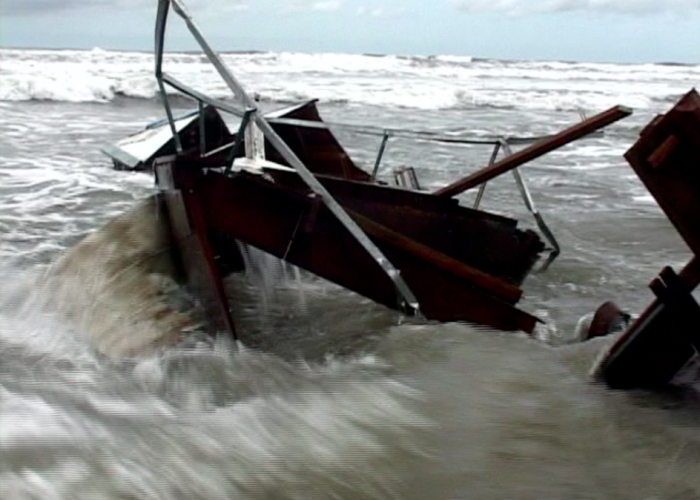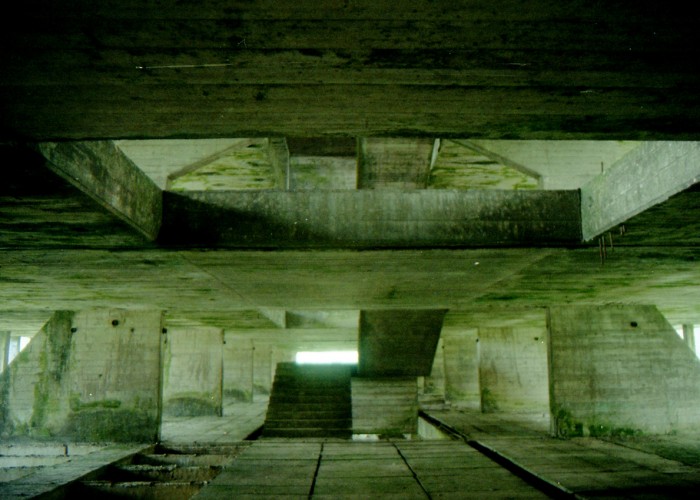The Riverbed
Carol Bensimon
translated by Adam Morris
They so happened to be born in a rather small town between two more or less larger ones, something they couldn’t get used to because it meant they had the whole highway to stare at. And they stared. And it so happened that on the shoulder of the highway was a store run from out of a house built in nineteen thirty-something, its front steps a set of bleachers for the girls. They’d sit there, all afternoon. Some cars went by, another stopped. Titi let her thin legs stick out onto the sidewalk, her mosquito bites scabbed into little cones of blood from so much scratching. Her t-shirt went down to her thighs, if you could call them thighs. The traveler begged her pardon and went inside. Titi hid her laughter. Lina, three years older, was more melancholy. She didn’t show her legs or anything else, and she was starting to have something else to show. She was scratching her name out with a stone, only a blue beaded bracelet ruptured her all-black attire. The traveler left with a coke. If families came in, so much the better, the store would creak like an old woman. Dona Celestina was doing the accounting with a pencil, in the slow hand of a grade school girl. The traveler hurried to get back to his travels. And inside the store the old men were playing dominoes without so much as speaking to each other.
Titi said early one March: it’s hot, we could go swimming, and smiled at Lina. Because by forcing their way down a path through the underbrush, they could get to where the river appeared, running like the road, its shores stretching into the distance, up to the sawmills, the abandoned factory, and dismal fish-fry-with-lemon on a plastic plate for anyone who couldn’t afford a more scenic vacation. But the girls hadn’t seen any of this. Lina didn’t think the river was so great anymore. Her feet stuck to the bottom, toes scraping the rough and sinking into the sand, and what kinds of places and people that water had been through was anybody’s guess. She didn’t respond. Titi rolled her gum into a ball, stuck her tongue through the middle. Some river, Lina went on thinking. It was even worse because now the boys went there to smoke, hidden behind the fig tree and laughing at any stupid thing, their feet sticking into the water, talking loud, laughing about whatever.
*
Titi got a running start into the river, beating the water with her open palms. Droplets went flying in scoops, a sound that drowned out the cars on the highway. She always seemed to be having fun, in spite of the endless repetition, and this made Lina feel pangs of rage that she smothered to keep from feeling wicked. Then she’d soothe herself and presto, she was breathing normally again. But who knew what would happen in two or three years if Titi kept up this eager pleasure for every little thing.
Lina started into the water slowly, feeling the chill, adjusting her bikini, looking at the shore, the forest. There wasn’t a single bicycle leaned against the trunk of the fig tree, and in the tree’s shade, nobody sprawled out, face up. There were only birds and fish nearby, the weariness of nothing happening at all. Stupid town. A square, a church, no stoplights, repeated conversations. Anyone who made it out became a hero, end of story. On Sunday, families went out walking from one end of the street to the other, very slowly, so they wouldn’t get to the end of town too quickly. They walked through the church. They walked along the square. When a hero came back from afar, the family went out to parade him around. And the others, on the corners, the few corners, cupped hands to their ears so they could go and tell what they’d heard him say.
Lina waded halfway into the river. As she submerged, she heard Titi start to say something, then the water muffled the rest. She opened her eyes underwater. Her sister’s legs were kicking in sync, like a wind-up toy in a tub. Lina took advantage of the silence for as long as she could. It was sort of nice. It gave her a moment to imagine or remember João. João was one of the boys, or the only one. The rest were just the boys who followed him around. They all laughed the same way (at João’s jokes). They all sat the same way (around João). They all played João’s video games. From the window some nights came the blue glow of the living room, the smell of popcorn, the sound of fingers tapping buttons, and the shouts of destroyed zombies, pow pow pow, but João was really good and they beat the game so quickly they were already asking for another one, because in João’s home there weren’t any special days for presents, no need to show good behavior. So it was this João that Lina wanted to imagine perched on a branch of the fig tree, with a cigarette behind his ear, smiling and offering—want one, Lina? Nothing happened.
She came up from the water. Just then the little one was flailing toward her with her big eyes sparkling from some happy fear, anxious to tell her something. You hear that? Yeah, uh, it’s a noise, what is it. Spit it out. Titi was breathing heavily. And even though there was virtually no one in sight, Titi cupped a hand around her mouth, and spoke from behind it.
*
They raced to gather their clothes and ended up with things on backwards. But you saw what? How big? How many? Lina was carrying her slip-ons in her hand because she was in too much of a hurry to put on her socks. They went quickly, their shirts dampened in spots, Titi out ahead pushing through stinging foliage with her legs, Lina with her jeans dragging in the grass. João must have been killing zombies when, near the river, the city shook with an uncovered secret. Lina’s foot slipped in the mud and they kept running. They got up close, huddled in the bushes. There were three bulldozers pushing everything under. They uprooted the trees, which fell one against the other. They backed up and then started forward again. Then came the sound of branches snapping and the exaggerated rustling of leaves, as in a big squall that sends children huddling beneath the covers on their beds. And from the split trunks, the sweet smell of sap filled the March air.
An empty space had already been opened in the middle of the mountain of green. It was where a man was giving orders and indicating directions to the bulldozers, and his fat, soft belly appeared every time he raised his arm. Six out of every seven days, this is what he had to do, demolish. He ran the back of his hand across his forehead and looked around. The girls crouched further down, and pulled each other into a thicker patch of underbrush. The man cleared his throat, the sound of a savage animal preparing to attack.
He spat on the ground. The earth had never seemed as red as it did now. The man shouted, pointed, spat. A bulldozer was wrestling with a huge tree that wouldn’t budge. The machine got louder and went full force. It cracked the trunk, and went at it again. A pleasant smell. From the sap. The earth stirred up. Again. They heard something give way, failing, a rip, a dry sound, like a fire being lit, like a princess carried off by her hair.
* *
Read this in Portuguese
* *
Image: Lucía Vassallo
[ + bar ]
Victoria Redel
BOTTOM LINE
As when my father goes back under and the doctor comes out to tell us he’s put a window in my father’s heart.
At last! The inscrutable years... Read More »
Passages: My Art as an Everything
Natalia Brizuela on Nuno Ramos translated by Andrea Rosenberg
“No sé.” “I don’t know.” That’s the response Tintin and Captain Haddock get from the inhabitants of the Andean country—vaguely... Read More »
The Reversal Spell
David Leavitt
The day that Paris was declared an Open City, I went to say goodbye to the Baron. He was one of my oldest friends.... Read More »
Natalia Litvinova
translated by Andrés Alfaro
DUST
My voice seems not to come from me but rather from another throat buried within the depths of my own. I am like a... Read More »








 sending...
sending...